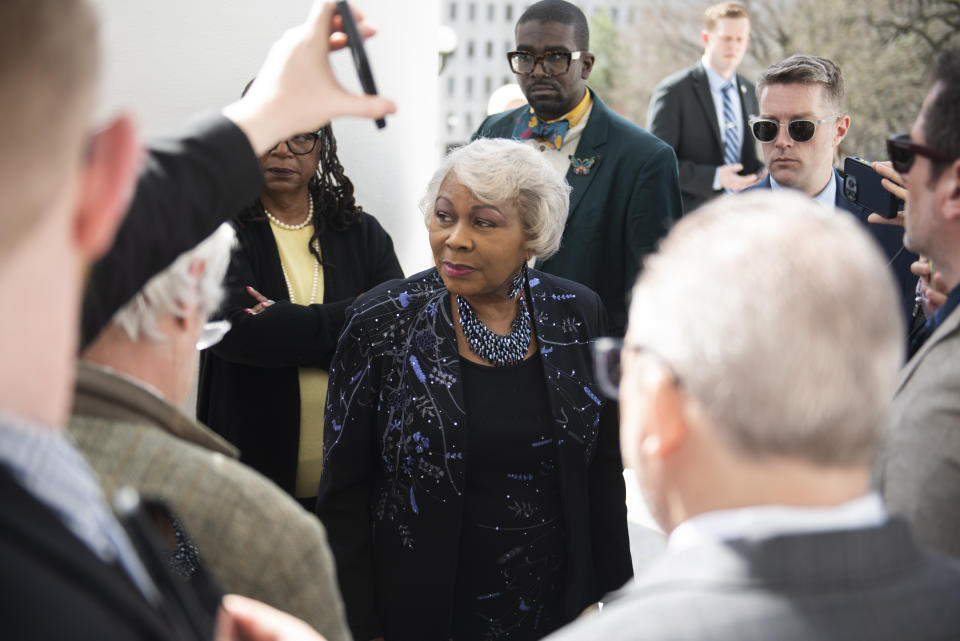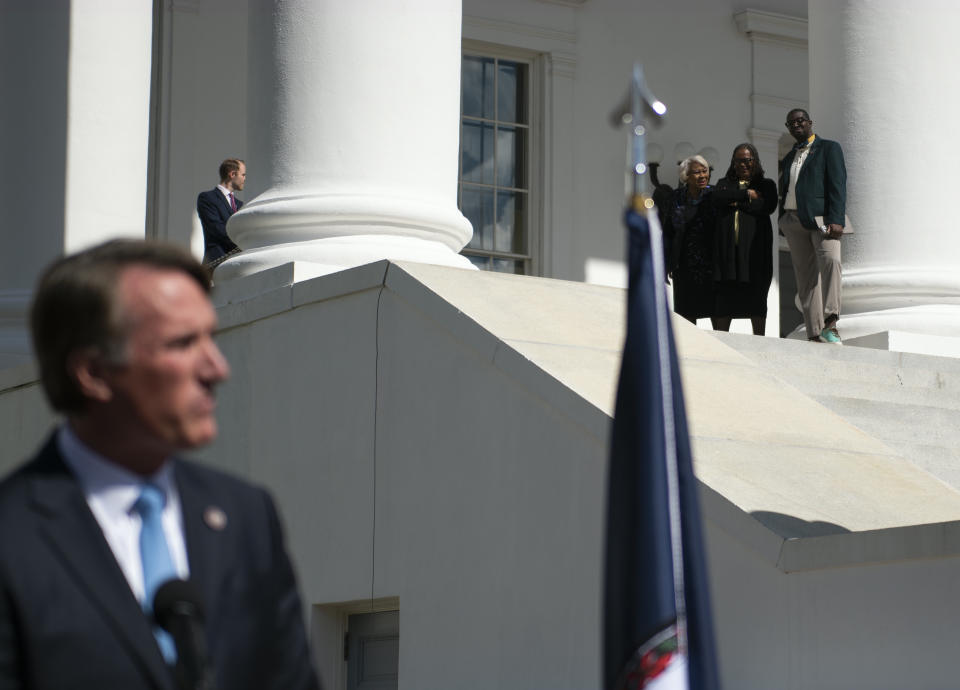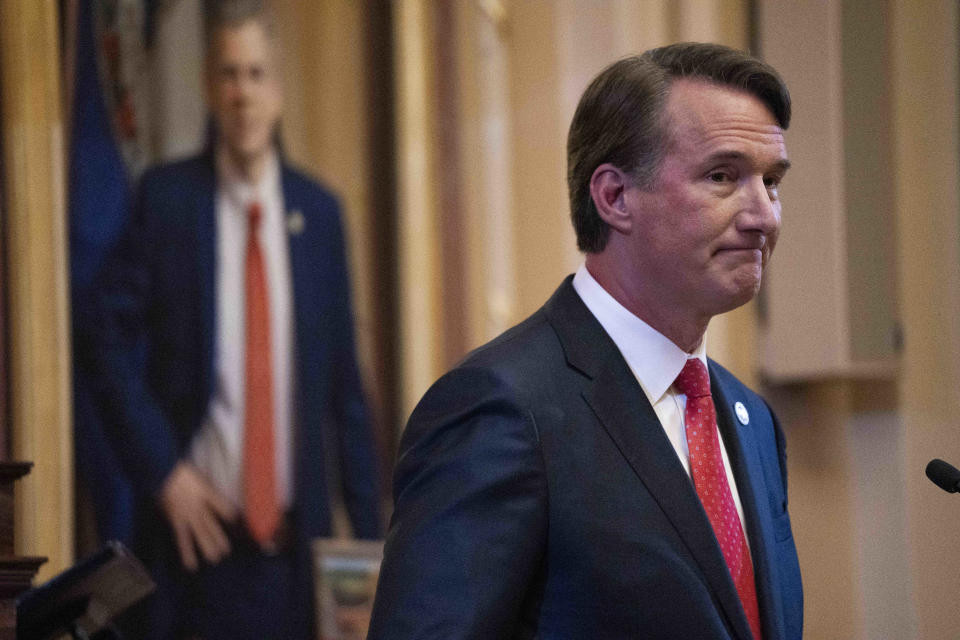How Virginia’s Caps, Wizards arena plan got blocked by state lawmakers
A few months ago, there were three avenues for Virginia state lawmakers to approve a new sports arena for the Washington Capitals and Wizards. What’s left now is more like a dirt road.
Virginia Gov. Glenn Youngkin (R) and the teams’ owner, Monumental Sports & Entertainment executive Ted Leonsis, announced in December that they had reached a nonbinding agreement to move both professional sports teams to a new arena in Alexandria. As they unveiled renderings of what would go in the Potomac Yard site, they conveyed a sense that the plan was all but certain.
Yet as arena legislation has been blocked again and again by state lawmakers in Richmond - most recently, excluded from a compromise over the state budget - the future is of the project is increasingly in question.
The plan’s omission from the budget marks the latest and biggest blow as the 60-day General Assembly session in Richmond nears its end. It severely narrows Youngkin’s pathways for pushing forward his top political priority - particularly because the governor indicated Thursday he has no immediate plans to pursue the limited options that are left.
Does that mean the teams are abandoning the move? Not quite - at least, not yet. Let us explain.
- - -
Youngkin always needed state lawmakers’ approval
Youngkin and Leonsis had pitched the $2 billion arena as a way to bring two major professional sports teams to a state with none. As they presented it, the sports facility would be the centerpiece of a 12-acre mixed-use complex, including a concert hall, underground parking, a Wizards practice facility, and Monumental’s corporate offices and media studio.
From the very beginning, that plan needed approval from the General Assembly in Richmond. Only the legislature can create a sports and entertainment authority, which would borrow $1.5 billion from Wall Street to help build the arena - and then lease it out to Monumental.
There were always three ways Youngkin could try to do get the legislature’s approval: Lawmakers could approve a bill starting in the House of Delegates or one originating in the State Senate. Or, the arena plan could have been folded into the state budget.
Ultimately, all of those pathways went through Senate Finance and Appropriations Committee Chairwoman L. Louise Lucas (D-Portsmouth), who managed to wield her role on that key committee - and sharp tongue on social media - to block the arena multiple times. On Wednesday night, Lucas tweeted a meme of herself flashing a peace sign over a grave with a headstone meant to represent the project.
- - -
A key lawmaker became the plan’s chief antagonist
Lucas, a veteran state lawmaker from the Hampton Roads region, has expressed increasingly grave doubts about the arena. Rising to a powerful position this year as chairwoman of the Senate Finance and Appropriations Committee, she has blasted what she’s labeled the “Glenn Dome” as a gift to billionaire Leonsis and a threat to state finances.
Two days before Youngkin and Leonsis went public with their announcement in December, a key group of a dozen state lawmakers met behind closed doors to give the governor a green light to pursue the deal. Because it took place before a wave of historic turnover in Richmond gave her the gavel, Lucas was not even in the room.
She suggested on social media after The Washington Post broke the news of that meeting that she might play ball in exchange for lowering highway tunnel tolls in her part of the state and establishing a legal marketplace for marijuana.
Lucas’s tone since then has only grown harsher, with warnings that the project could jeopardize the state’s prized AAA bond rating and leave taxpayers on the hook for $1.5 billion in bonds if projections come up short. She has made it clear that Hampton Roads toll relief alone would not sway her.
Over the past month and a half, she wielded her gavel repeatedly to block the arena from making it through the state legislature.
- - -
Youngkin’s Senate and House bills got blocked
As the General Assembly session started in January, most state lawmakers said they were in the dark on the arena plan. It wasn’t until more than a week in that two powerful state lawmakers filed separate pieces of legislation to create the sports and entertainment authority, using language from Youngkin.
Senate Majority Leader Scott A. Surovell (D-Fairfax) said he had agreed to introduce the bill in exchange for the governor supporting increased funding for the Metro transit system over the next two years.
But Lucas’s committee chair role allows her to decide which money-related bills get heard by that group of lawmakers before they go to the larger state Senate. After the governor insulted Democrats in a partisan speech at a college campus, Lucas said that she would not docket Surovell’s arena bill and declared the project dead. Strike one.
In the House of Delegates, Appropriations Committee Chairman Del. Luke E. Torian (D-Prince William) filed similar legislation that faced a smoother path at first: His committee advanced a plan modeled on Youngkin’s draft language, with some modest changes.
The full House then approved that bill on a vote of 59-40, though some lawmakers said they voted for it only to keep the matter moving forward before making final decisions later on.
But because a bill approved by one chamber must then pass through the other side of the General Assembly, the legislation again had to make it by Lucas’s desk. That was strike two against the arena: She again refused to give it a committee hearing.
- - -
The arena did not make it into the state budget
The third option on the table was folding the arena into the state budget. This was never as popular with state lawmakers because it meant any debate on the plan could get muddled in discussions over tax cuts, spending and a host of other issues.
Each chamber in the General Assembly is tasked with making its own edits to Youngkin’s budget proposal. That process begins with the money committees, so the power again fell to Lucas and her committee on the state Senate side.
One of the starkest differences between the chambers’ spending blueprints came down to the arena: The House budget language incorporated Torian’s amended arena bill, but the Senate budget omitted the arena plan entirely.
That was true even after each chamber approved its separate budget proposal. That left a small committee of lawmakers - including Lucas - to hash out the differences between the two plans behind closed doors. Lucas was one of a dozen in that group, which released its compromise on Thursday without any arena language. Strike three.
Lucas seemed to gleefully take full responsibility. She shared a meme of herself on X with the caption, “Tell Glenn I want him to know it was me.”
- - -
Youngkin has a few options left
Youngkin has several options for reviving the plan: He could call a special legislative session to consider the arena at any time, a costly step he has resisted in the past on other matters. He is widely expected to resurrect the arena through a budget amendment or stand-alone bill when the legislature returns April 17 to consider bills the governor has vetoed or amended.
But he indicated Thursday that he has no immediate plans to pursue other avenues. “The next step is for the General Assembly, and particularly the Senate, to embrace the opportunity. It’s their move,” he said.
Whether they do so is still an open question. House Speaker Don L. Scott Jr. (D-Portsmouth) said he was not quite ready to pronounce the arena dead. “There have been several conversations back and forth. It’s not final until it’s final,” he said.
If it does advance, the Alexandria City Council would need to approve the deal, too.
Related Content
The true, dramatic story of Robert Downey Jr.’s ‘Oppenheimer’ villain
This agency is tasked with keeping AI safe. Its offices are crumbling.
U.S. floods arms into Israel despite mounting alarm over war’s conduct

 Yahoo News
Yahoo News 


